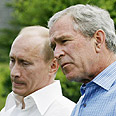
Putin and Bush
צילום: רויטרס
The price of ignoring Russia
Russia's recent moves, such as its joint military exercises with China, are a signal that Moscow is seeking to reclaim its status on the world stage. Its growing ties with Syria and Iran should be of concern to Israeli policymakers
Are we on the verge of a renewal of the Cold War?
On the one hand, Russia, under Vladimir Putin's leadership and after years of international weakness, is trying to establish itself on the world stage through a demonstration of its military strength. On the other hand, today's Russia is not the Communist Soviet Union, which had a revolutionary ideology it looked to spread around the world.
Just like the United States and its backyard – Latin America – Russia, with its assertive policy, is looking to make abundantly clear that the areas on its border are within its sphere of influence. This explains Russia's sensitivity to events in countries such as Georgia and Ukraine.
It is obvious that Russia wants to send a clear a message: that Russia cannot be ignored. One of the major mistakes of western, and in particular American, foreign policy following the break up of the Soviet Union and Russia's weakness in the last decade of the twentieth century, has been not to view Moscow as an important factor in international relations.
To continue to ignore Russia is a mistake, because it is a superpower, with clear interests and economic strength, particularly given Europe's reliance on her in the energy sector.
The joint military exercises with China were an interesting signal, which succeeded in annoying a number of people in the West. At the same time, it must not be forgotten that China is today the superpower with the closest economic ties with the United States. It should also be remembered that during the height of the Cold War, Soviet-Sino relations were also tense.
We are now witness to a redrawing of the international array of power, and Russia is not a factor that can be ignored over the next decade. In this context, it is worth stressing that alongside the close ties and cooperation between Israel and Putin's Russia, particularly in sensitive topics such as the fight against terror, there is also the worrying phenomenon of the strengthening of ties between Russia and Syria and Iran.
This was the not the situation during the period of the Cold War, when there was a deep hostility between Israel and the Soviet Union, which persecuted its Jewish citizens. Today the picture is more complicated, and these developments demand a serious and systematic government discussion as to our ties with Russia.
I am not sure that such a discussion is taking place.
The writer is a professor at the Hebrew University of Jerusalem and a former director-general of the Foreign Ministry. This article is based on an interview with him in Yedioth Ahronoth










